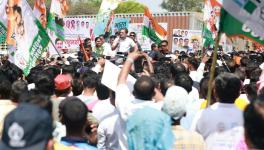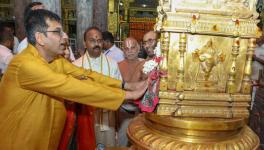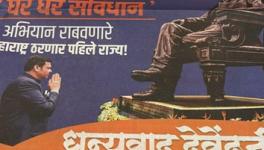Rahul Nails Hindutva, but Congress will Still have to be Organisationally Alert
Congress MP Rahul Gandhi made an extremely relevant point on 12 November: That there is a wide gulf between two phenomena that many people confuse and others conflate, intentionally or unintentionally. These are Hinduism and Hindutva.
Addressing by videoconference a party training camp at Wardha, Rahul began rhetorically: “What is the difference between Hinduism—as we know it—and Hindutva? Are they the same thing? Can they be the same thing?”
Of course not, was his answer. Thus: “Is Hinduism about beating a Sikh or a Muslim? Is Hinduism about killing Akhlaq? Hindutva, of course, is. Where is it written that religion is about killing an innocent man? I am unable to find this.”
In the course of his speech, Rahul characterised Hindutva, contrasting it not only to Hinduism, but also to the Congress creed. Some context needs to be provided and a point must be made.
That Rahul chose a party training session to make his remarks was hardly accidental. In his address, he made the point that bit by bit, more and more people must be made aware of the distinction between Hinduism and Hindutva, so they in turn can spread the word. Obviously, Rahul is trying sensitise party workers and prepare them for an ideological battle against the Bharatiya Janata Party (BJP) and the Sangh parivar, in which making this distinction will be a crucial weapon. His remarks may have been provoked by a controversy generated by a similar distinction made by another Congress leader, Salman Khurshid. In Sunrise over Ayodhya, his book released last week, Khurshid writes that the classical version of Hinduism was being pushed aside by a “robust version of Hindutva” that is similar to jihadist Islam. No points for guessing this was greeted by howls.
Rahul perhaps took the opportunity to defend a colleague to dilate on the issue, for the benefit of party workers, but also for the citizenry. At the heart of the problem, he seemed to suggest, is that the crucial distinction between Hinduism and Hindutva was getting drowned by a cacophony because the Congress ideology had been overshadowed by the Rashtriya Swayamsevak Sangh (RSS) ideology of hate.
And what exactly in Rahul’s reckoning is the Congress ideology? Essentially, Rahul counterposed the syncretic and heterodox religious tradition of the Bhakti saints, based on universal love, against the muscular and orthodox exclusiveness of the Hindutva ideology. Rahul described his party’s ideology as an ocean reflecting the wisdom of thousands of years of Indian life. In doing so, he referenced Shiva, Kabir, Guru Nanak, and then Gandhi.
What Rahul was doing was very clever, politically speaking. Instead of being diverted into a debate between secularism and ‘Hinduism’, which is an important conversation but which does not have much political heft at the current juncture, Rahul was nullifying the Sangh parivar’s monopolistic claim to Hinduism.
In effect, he was saying that the BJP and its fellow travellers in the parivar had simply got Hinduism wrong—they were peddling a spurious and counterfeit version of Hinduism and India’s tradition. He asked, “Is there something common between what Guru Nanak said or Kabir said or King Ashoka said and the Hindutva ideology?”
By this detour Rahul arrived at the point that though the Congress’s ideology was alive and well it had been overshadowed by the RSS’s ideology of hate, partly because “of a complete capture of the media, a complete capture of the Indian nation, but it has also been overshadowed because we have not propagated our ideology among our own people aggressively”.
Rahul seems to be on thin ice in this part of his argument. Let us assume that the media has been completely captured. But what does that signify? Can the capture of the media be a significant cause for the marginalisation of an ideological tradition going back a century or more, which draws, in Rahul’s reading, on ideological and religious traditions that are centuries old?
Or, is it true, in the first place, that the BJP/Sangh parivar has “completely captured” the nation? Of course it’s not. It is true that Hindutva has gained considerable traction over the past three decades and it is certainly true that the BJP is the dominant political force in India today. But that is it.
We must go beyond what Rahul told party workers, whilst acknowledging that what he is saying is not necessarily wrong. He is bang on when he says, ‘The central way we have to propagate our ideology is by training our own people and by involving our own people in conversation about what it means to be a Congress person and how that is different from being an RSS person.”
But Rahul is missing something crucial here. Let’s rewind to the Congress Working Committee meeting held on 16 October, when the roadmap for the party’s organisational elections was charted. Rahul had said in a speech, described by colleagues as powerful, that organisational issues and personal positions were irrelevant to the larger ideological battle for India’s future. India was facing exceptional challenges, he had said, and grappling with them demanded ideological purity.
There are two problems with this perspective. First, the idea of “ideological purity” is deeply problematic in the domain of practical electoral politics. The Congress has never in its history striven to achieve any such utopian objective. To have a defined ideology from which one should not deviate too much is enough.
Second, the idea that organisational issues are irrelevant in practical politics is preposterous. Someone should tell Rahul that while ideology is an important basis for a party’s political project (which, in fact, is to come to power through an electoral process), a proper organisational foundation is indispensable.
It is, in fact, the neglect of the organisation, which is logically followed by an inability to carry out mass-contact programmes and mobilise people, that has brought the Congress to its current state of impotence. Conversely, the BJP has prospered because it spends an inordinate amount of time and energy in attending to the nitty-gritty of organisational issues.
To the extent that the BJP has captured the nation, it is because of this, for it is not above deviating from the Hindutva ideology when convenient. Hindutva is a political project that the BJP hopes to consummate by capturing or undermining institutions and by destabilising the foundational constitutional framework on which democracy rests. And it hopes to do this by continuously strengthening its organisation and using the RSS’s huge network.
In a sense, Rahul has got the means and ends sequence wrong. The Congress must capture power to protect institutions and the constitutional framework by re-inscribing into the system the foundational principles of democracy. Whether the inspiration comes from the Bhakti saints or from a larger pool of heterodox religious, cultural, social and political exemplars is a matter of choice.
But let us be clear on one point: Defining an ideological position and defending it is obviously important, especially at this juncture of the nation’s history, but banging on about it won’t help win elections. A strong organisation with a decisive leadership and clear transmission channels will.
The author is an independent journalist and researcher. The views are personal.
Get the latest reports & analysis with people's perspective on Protests, movements & deep analytical videos, discussions of the current affairs in your Telegram app. Subscribe to NewsClick's Telegram channel & get Real-Time updates on stories, as they get published on our website.























